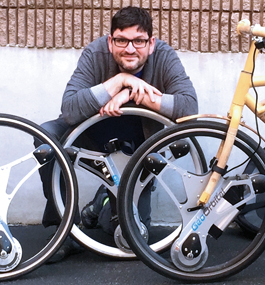Reinventing the Wheel

Courtesy Michael Burtov
Michael Burtov '02
Sometimes, inspiration strikes in the unlikeliest of moments. For instance, during a cyberworld chase scene in the sci-fi sequel “Tron: Legacy.”
As Michael Burtov ’02 watched the movie’s protagonist and bad guys ride futuristic motorcycles with completely hollow wheels late one night two years ago, he had an epiphany.
“What if we could put something in those wheels?” Burtov remembers thinking. “I’d seen e-bikes, but nothing like what I had conjured in my head.”
Despite having no background in engineering or bicycles — he majored in psychology at Brandeis — Burtov spun into action, building a prototype for a front-mounted, electric-powered bicycle wheel in his kitchen.
This fall, Burtov’s Cambridge-based company, GeoOrbital, distributed its first batch of $950 lithium ion battery-powered bicycle wheels. The wheel features a top speed of 20 mph over a 20-mile range. A former SpaceX engineer now oversees the wheel’s technical aspects.
Most electric-bike conversion kits contain rear-mounted hub motors, and batteries and electronics that need to be installed on the bike frame. The front mount of GeoOrbital’s wheel allows it to be attached or removed in about a minute, in large part because it is not connected to the bike’s drivetrain.
After bootstrapping itself for two years, GeoOrbital raised $150,000 in an opening round of funding from angel investors in early 2016. Burtov then turned to the online fundraising site Kickstarter, initiating a campaign last May that sought a modest $75,000. This number was quickly shattered as donations poured in. When the campaign ended 45 days later, the company had raised more than $1.2 million, in part by promising to give donors at certain levels one of the first wheels.
The Kickstarter campaign “validated our market, validated our product, and it made us grow much more quickly,” Burtov says.
Electric-powered bicycles and electric bicycle accessories are a growing and increasingly competitive industry. Bloomberg News estimates the global market in e-bike sales, which is at almost $16 billion this year, will reach almost $25 billion by 2025.
“The world is really exploring mobility. Anybody who needs to move stuff around a city, whether it is people or goods, is looking for alternatives,” Burtov says.
— Jarret Bencks
